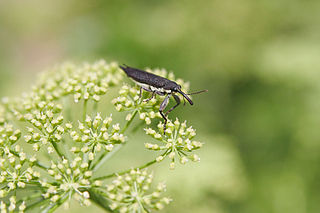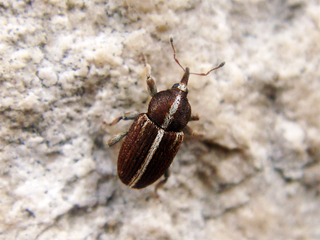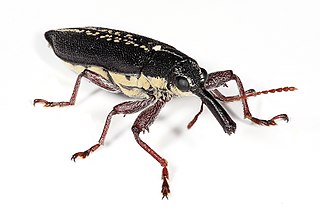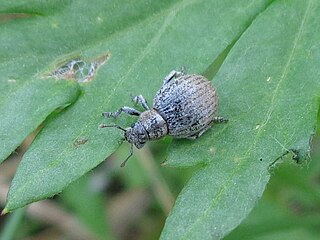
The Curculionidae are the family of the "true" weevils. They are one of the largest animal families, with 6,800 genera and 83,000 species described worldwide. They are the sister group to the subfamily Brentidae

Weevils are beetles belonging to the superfamily Curculionoidea, known for their elongated snouts. They are usually small, less than 6 mm in length, and herbivorous. About 97,000 species of weevils are known. They belong to several families, with most of them in the family Curculionidae. Some other beetles, although not closely related, bear the name "weevil", such as the biscuit weevil, which belongs to the family Ptinidae.

The beetle subfamily Curculioninae is part of the weevil family Curculionidae. It contains over 23,500 described species in 2,200 genera, and is therefore the largest weevil subfamily. Given that the beetle order (Coleoptera) contains about one-quarter of all known organisms, the Curculioninae represent one of the – if not the – most successful radiations of terrestrial Metazoa.

The insect tribe Stromboscerini is part of the weevil family Curculionidae, subfamily Dryophthorinae. It is a small and little-known weevil group. Alonso-Zarazaga & Lyal (1999) treated it as a subfamily.

Belidae is a family of weevils, called belids or primitive weevils because they have straight antennae, unlike the "true weevils" or Curculionidae which have geniculate (elbowed) antennae. They are sometimes known as "cycad weevils", but this properly refers to a few species from the genera Parallocorynus and Rhopalotria.

Brentidae is a cosmopolitan family of primarily xylophagous beetles also known as straight-snouted weevils. The concept of this family has been recently expanded with the inclusion of three groups formerly placed in the Curculionidae; the subfamilies Apioninae, Cyladinae, and Nanophyinae, as well as the Ithycerinae, previously considered a separate family. They are most diverse in the tropics, but occur throughout the temperate regions of the world. They are among the families of weevils that have non-elbowed antennae, and tend to be elongate and flattened, though there are numerous exceptions.

Cryptorhynchinae is a large subfamily of weevils (Curculionidae), with some 6000 species. They are found in most zoogeographic regions although they are most diverse in the Neotropics, Australia and Oceania.

The Entiminae are a large subfamily in the weevil family Curculionidae, containing most of the short-nosed weevils, including such genera as Otiorhynchus, Phyllobius, and Sitona. Some of these weevils are notorious pests of major economic importance.

Baridinae is a subfamily of true weevils (Curculionidae). It was established by Carl Johan Schönherr in 1836. Some 4,300 species in 550 genera are placed here, most of which occur in the New World. A few are economically significant pests, while others are in turn used for biocontrol of invasive plant pests. This subfamily also contains a few endangered species.

Hadramphus, commonly known as knobbled weevils, is a genus of flightless molytine weevils from the family Curculionidae. It is endemic to New Zealand and consists of four species.

Sibinia subelliptica is a species of acorn and nut weevils belonging to the family Curculionidae, subfamily Curculioninae.

Rhamphini is a weevil tribe in the subfamily Curculioninae.

The Celeuthetini are a weevil tribe in the subfamily Entiminae.
Cylydrorhinini is a weevil tribe in the subfamily Entiminae.
Ectemnorhinini is a weevil tribe in the subfamily Entiminae.

Eustylini is a weevil tribe in the subfamily Entiminae.
Oosomini is a weevil tribe in the subfamily Entiminae.
Ophryastini is a weevil tribe in the subfamily Entiminae.

Peritelini is a weevil tribe in the subfamily Entiminae.

Philopedon is a genus of broad-nosed weevils in the beetle family Curculionidae. There are about seven described species in Philopedon.
















